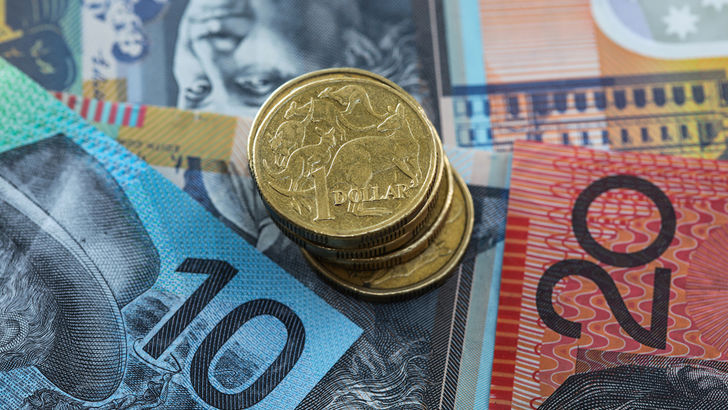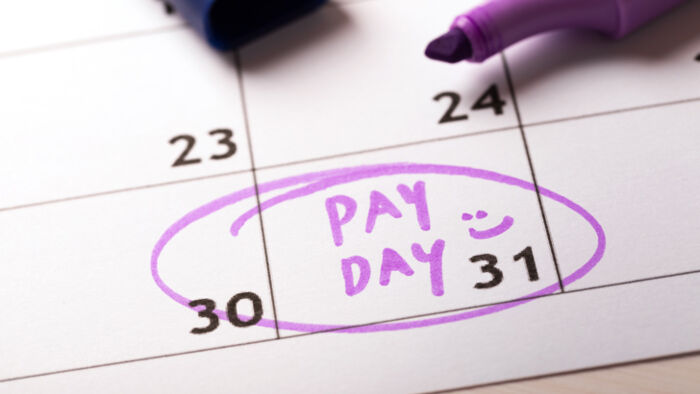How to make your budget work when you get paid monthly
By Tom Watson
Making your income last from one payday to the next can be a balancing act at the best of times, let alone when elevated living costs are taking a larger chunk of our money than usual.
Over the past year, nine in 10 Australians surveyed by consumer group Choice said that they had seen their household bills and other expenses rise.
Budgeting can be especially tricky for workers who are paid monthly who need to ensure that they've got enough money throughout those four weeks for bills, spending and, ideally, savings.
After all, seeing a hefty figure hit your account will test the spending resolve of even the most disciplined budgeter.
So, whether you've started a new job where you get paid less frequently, or you just want to become more efficient at managing your current monthly salary, here are some tips to set you up for success.
1. Make a budget
If you haven't already, creating a budget could be a great place to start because it can be easy to blow through a monthly salary without one. And even if you already have a budget, it might not be a bad idea to update it, particularly if your income or expenses have changed recently.
To get started, you'll need to pull together your income (e.g. your regular salary or other earnings) and your expenses (e.g. your bills and everyday spending). Once you've got an overview of those, the next step is to work out where and how you want to allocate your money. There are plenty of ways to do this, including various budgeting methods. Here's a quick rundown of two of the more popular ones:
- 50/30/20 budget: One of the simplest methods out there, the 50/30/20 budget is all about allocating your money based on your needs, wants and goals. The technique advocates for the following percentage split: 50% of your money should go towards needs like housing, food, transport and utilities; 30% should go towards wants like socialising and eating out; 20% should go towards savings and other financial goals. Of course, you can also finetune the percentages to suit your own needs.
- Zero-based budget: A more involved method, zero-based budgeting is all about giving every single dollar of your income a purpose. At the start of each month or pay period, you allot a specific amount of income towards rent, groceries, bills, transport costs, savings, debt repayments and so on until you're left with nothing to assign. Throughout the period you'll want to keep make sure you're not overspending in any areas, and once it's over you'll start the cycle again (tweaking as necessary) after your next lot of monthly pay comes in.
Whichever budgeting style you choose though, tracking your spending is going to be key to keeping yourself accountable. Luckily there are plenty of options out there to help you keep tabs: from a pen and paper to a spreadsheet or one of the many budgeting and tracking apps available.
Tip: Ready to create a budget of your own? ASIC Moneysmart's budget planner tool, which allows you to easily input your expenses and income over a variety of timeframes, is a great place to get started.
2. Prioritise your bills and essentials
Once you've been paid, tackling your bills might be one of your first priorities because once they're out of the way you'll have more freedom to spend in other areas.
One benefit of getting paid each month is that many bills (e.g. streaming, mobile and internet services) work on the same monthly cycle, so if you can, set them up to be due just after you've been paid so that you can either manually pay them, or have them automatically debited, straight away.
Other bills may be on longer cycles, such as quarterly electricity, gas and water bills, or annual insurance premiums. That doesn't mean you shouldn't be proactive about putting money towards them though.
One option to consider is setting up a separate bank or savings account into which you transfer the equivalent monthly share of those quarterly or annual bills each time you get paid. For example, if your electricity bill is roughly $300 each quarter, you could transfer $100 each month into the separate account. That way you'll be able to avoid bill shock when those payments are due.
Alternatively, if your providers allow it, you could even consider directly pre-paying a portion of your upcoming bills each month.
Tip: One regular cost worth considering is your mortgage. Because of a quirk between the number of fortnightly payments in a year compared to the equivalent number of monthly payments, paying off your loan via weekly or fortnightly repayments could save you thousands in interest over the life of your loan.

3. Don't neglect your savings
Paying your bills is obviously important, but so is paying yourself. Unfortunately, even with the best of intentions, it can be easy to reach the end of the month and find that you don't actually have as much money left over as you would have liked to put into your savings account.
If that sounds familiar, you may want to prioritise your savings in the same way you would your bills by putting money towards them as soon as you get paid. Not only will this help you actually hit your savings goals, it means you'll have a backstop in place if you're ever faced with any unexpected expenses.
One way to keep your savings goals on track is to create specific sub-accounts for each one, which is an option made available by many banks these days. That way you can dedicate funds to different goals (e.g. an emergency fund or an overseas holiday) and easily track their progress.
Tip: If you're often tempted to dip into your savings, one way to ensure that you can't access them quite as easily is by putting them in a savings account with another bank. That way they're not sitting right next to your transaction account, and there's an extra step involved to transfer them.
4. Set a weekly spending limit
When your monthly pay hits your bank account it can be easy assume that - because it's such a big figure - it will comfortably see you through until your next pay day. That's not always the case though, which is why it can be worth setting yourself a spending limit such as breaking your monthly pay up into weekly portions.
Let's say you get paid $4,000 each month. After covering your bills and other necessities, as well as putting some money towards savings, you're left with $1,000 for discretionary (i.e. fun) spending. Instead of blowing through that money ahead of schedule and being forced to dip into your savings, you could set yourself a $250 weekly spending limit.
This is where having the ability to create multiple accounts comes in handy. Rather than having that $1,000 sitting in your transaction account, transfer $750 into a separate account and leave yourself $250 to spend. And once the week's over, top it up to $250 again.
Tip: Instead of keeping discretionary funds in a bank account, some people only pay for their discretionary purchases using cash. That's because the tangible nature of notes and coins helps some people better appreciate what they have to spend.
What if you fall short?
Unexpected expenses are part of life, which means that even with the best laid plans you might find that your monthly pay just isn't going to stretch far enough one month. That's why - ideally before it gets to that point - you'll want to think about your back-up options.
- Emergency fund: This why building up an emergency fund can be crucial, because it can be your first port of call if any unexpected bills or costs crop up. It may be worth keeping these funds in a dedicated savings account, but one which is still easily accessible should you need it.
- Credit card: While you may be better off using your own money to cover unexpected expenses, if that's not an option then a credit card could be an alternative - especially if you're able to pay back the balance without accruing any interest or fees.
- Wage advance apps: A growing number of providers, and even some banks, are beginning to offer services which allow workers to access their regular pay ahead of time. Bear in mind that these aren't free though, as most will charge a flat fee or a percentage of the transaction
If you're in a more severe financial predicament you may be able to access a crisis payment from the government, or financial assistance for food and bills from a number of charities and community groups. For more information, as well as other options visit Moneysmart's resource page for urgent help with money, or phone 1800 007 007 to speak to a financial counsellor via the National Debt Helpline.
Get stories like this in our newsletters.



